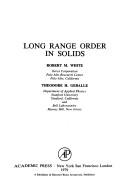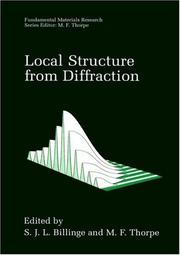| Listing 1 - 4 of 4 |
Sort by
|
Book
ISBN: 1470410036 Year: 2012 Publisher: Providence, Rhode Island : American Mathematical Society,
Abstract | Keywords | Export | Availability | Bookmark
 Loading...
Loading...Choose an application
- Reference Manager
- EndNote
- RefWorks (Direct export to RefWorks)

ISBN: 0126077754 9780126077759 Year: 1979 Volume: 15 Publisher: New York: Academic press,
Abstract | Keywords | Export | Availability | Bookmark
 Loading...
Loading...Choose an application
- Reference Manager
- EndNote
- RefWorks (Direct export to RefWorks)
Mechanical properties of solids --- Thermal properties of solids --- Magnetic properties of solids --- Long range order (Solid state physics) --- 538.9 --- Lattice dynamics --- Order-disorder models --- Solid state physics --- Physics of condensed matter (in liquid state and solid state) --- Long range order (Solid state physics). --- 538.9 Physics of condensed matter (in liquid state and solid state) --- Ordre à grande distance (physique) --- order disorder --- TRANSFORMATIONS --- MAGNETISM --- SOLIDS --- SUPERCONDUCTIVITY --- Monograph --- Magnetism. --- Solids. --- Superconductivity. --- Electric conductivity --- Critical currents --- Superfluidity --- Transparent solids --- Mathematical physics --- Physics --- Electricity --- Magnetics
Book
ISBN: 9780821889763 Year: 2013 Publisher: Providence, R.I. American mathematical Society
Abstract | Keywords | Export | Availability | Bookmark
 Loading...
Loading...Choose an application
- Reference Manager
- EndNote
- RefWorks (Direct export to RefWorks)
Mathematical physics --- Thermodynamic equilibrium. --- Phase rule and equilibrium. --- Mathematical physics. --- Nuclear spin --- Long range order (Solid state physics) --- Equilibre thermodynamique --- Loi des phases et équilibre --- Physique mathématique --- Spin --- Ordre à grande distance (Physique) --- Mathematical models --- Modèles mathématiques --- Mathematical models. --- 51 <082.1> --- Mathematics--Series --- Nuclear spin. --- Loi des phases et équilibre --- Physique mathématique --- Ordre à grande distance (Physique) --- Modèles mathématiques --- Phase rule and equilibrium --- Thermodynamic equilibrium --- Equilibrium, Thermal --- Equilibrium, Thermodynamic --- Equilibrium thermodynamics --- Thermal equilibrium --- Chemical equilibrium --- Thermodynamics --- Chemistry, Physical and theoretical --- Critical phenomena (Physics) --- Equilibrium --- Chemical systems --- Critical point --- Spin, Nuclear --- Angular momentum (Nuclear physics) --- Nuclear physics --- Physical mathematics --- Physics --- Lattice dynamics --- Order-disorder models --- Solid state physics --- Mathematics

ISBN: 1280206489 9786610206483 0306470772 0306458276 Year: 2002 Publisher: New York, NY : Springer US : Imprint: Springer,
Abstract | Keywords | Export | Availability | Bookmark
 Loading...
Loading...Choose an application
- Reference Manager
- EndNote
- RefWorks (Direct export to RefWorks)
This series of books, which is published at the rate of about one per year, addresses fundamental problems in materials science. The contents cover a broad range of topics from small clusters of atoms to engineering materials and involve chemistry, physics, materials science and engineering, with length scales ranging from Ångstroms up to millimeters. The emphasis is on basic science rather than on applications. Each book focuses on a single area of current interest and brings together leading experts to give an up-to-date discussion of their work and the work of others. Each article contains enough references that the interested reader can access the relevant literature. Thanks are given to the Center for Fundamental Materials Research at Michigan State University for supporting this series. M.F. Thorpe, Series Editor E-mail: thorpe @ pa.msu.edu East Lansing, Michigan PREFACE One of the most challenging problems in the study of structure is to characterize the atomic short-range order in materials. Long-range order can be determined with a high degree of accuracy by analyzing Bragg peak positions and intensities in data from single crystals or powders. However, information about short-range order is contained in the diffuse scattering intensity. This is difficult to analyze because it is low in absolute intensity (though the integrated intensity may be significant) and widely spread in reciprocal space.
Materials --- Diffraction patterns. --- Long range order (Solid state physics) --- Microscopy. --- Mechanics, applied. --- Analytical biochemistry. --- Chemistry, Physical organic. --- Surfaces (Physics). --- Theoretical and Applied Mechanics. --- Analytical Chemistry. --- Physical Chemistry. --- Characterization and Evaluation of Materials. --- Condensed Matter Physics. --- Mechanics. --- Mechanics, Applied. --- Analytical chemistry. --- Physical chemistry. --- Materials science. --- Condensed matter. --- Condensed materials --- Condensed media --- Condensed phase --- Materials, Condensed --- Media, Condensed --- Phase, Condensed --- Liquids --- Matter --- Solids --- Material science --- Physical sciences --- Chemistry, Theoretical --- Physical chemistry --- Theoretical chemistry --- Chemistry --- Analysis, Chemical --- Analytic chemistry --- Chemical analysis --- Chemistry, Analytic --- Applied mechanics --- Engineering, Mechanical --- Engineering mathematics --- Classical mechanics --- Newtonian mechanics --- Physics --- Dynamics --- Quantum theory --- Chemistry, Physical and theoretical.
| Listing 1 - 4 of 4 |
Sort by
|

 Search
Search Feedback
Feedback About UniCat
About UniCat  Help
Help News
News